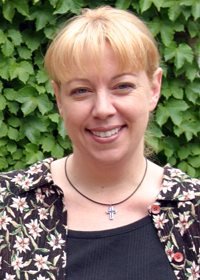HMC Joins Brain Tumor Ecology Collaborative
December 3, 2012Harvey Mudd College has been awarded funding through the James S. McDonnell Foundation to pursue the development of the Brain Tumor Ecology Collaborative with Washington University in St. Louis (lead institution), Columbia University and University of California at San Diego. Lisette de Pillis, Norman F. Sprague Jr. Professor of Mathematics and the Life Sciences at HMC, is one of the core group collaborators who will begin work Jan. 1, 2013 on the three-year project.
De Pillis will work with David Gutmann of WUSTL, Peter Canoll of Columbia University and Mark Ellisman of UCSD to establish an interactive scientific forum. Participants will include mathematical modelers specializing in complex systems, integrative cell and molecular biologists working on processes key to establishing and to maintaining cellular communities, and cancer researchers interested in understanding the brain tumor microenvironment. The initiative will enable these scientists to pool their collective expertise and insights to create alternative conceptual frameworks and experimental designs for new types of studies that may result in a better understanding of the behavior of tumors that start in the brain or spine, also known as a glioma.
“One of the goals of this new collaborative is to explore, from an ecological perspective, completely new ways of understanding brain tumors, what stimulates their development, and which factors yield promising treatment targets,” said de Pillis. Recognized as an expert in the field of tumor modeling, de Pillis has published numerous papers on her research: curing cancer with mathematics. She uses differential equations—mathematical sentences—to define the variables involved in tumor growth rates, to identify the effects of different concentrations of immune cells and drugs on tumors and to anticipate the tumor decay patterns.
The collaborative is comprised of individuals who recognize an unprecedented opportunity to build an infrastructure, including a virtual tissue space and collaborative web-based online forum to integrate data sets from multiple research groups. Collaborators will investigate experimental methods spanning multiple strata, encompassing molecular, cellular and tissue-based data, allowing exploration of this interconnected and complex information.
De Pillis and her undergraduate research partners have garnered attention for their work, including notice from the top professional organization for applied mathematicians. De Pillis has been an investigator on two National Science Foundation-funded mathematical biology projects and advises for HMC’s mathematical biology major, one of the first such undergraduate programs in the United States. HMC’s mathematical biology program, the only program that meets the Bio2010 recommendations for preparing research scientists in the 21st century, has risen to become a leader in both curriculum and undergraduate research innovation. De Pillis also is serving as the director of the HMC Global Clinic program.
De Pillis joined collaborators at WUSTL in December to give a talk in the Neuro-oncology Seminar Distinguished Speakers for 2012 series.

